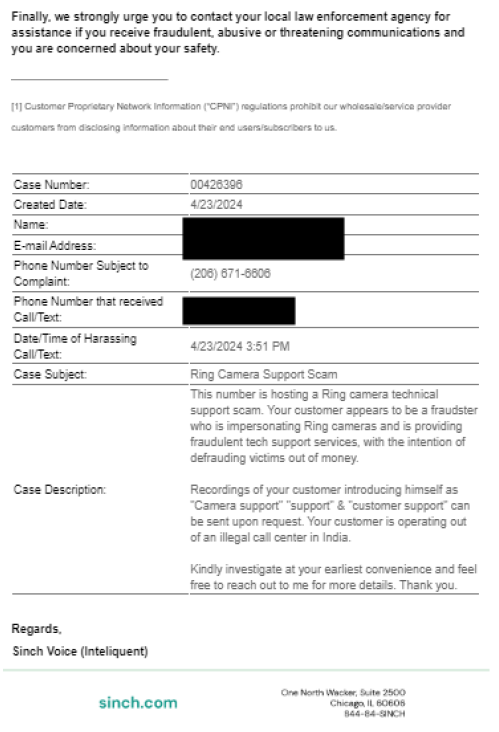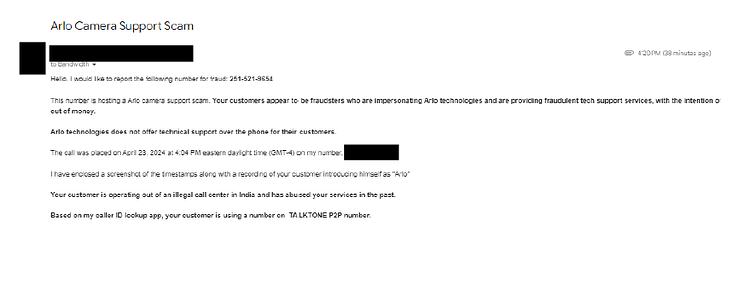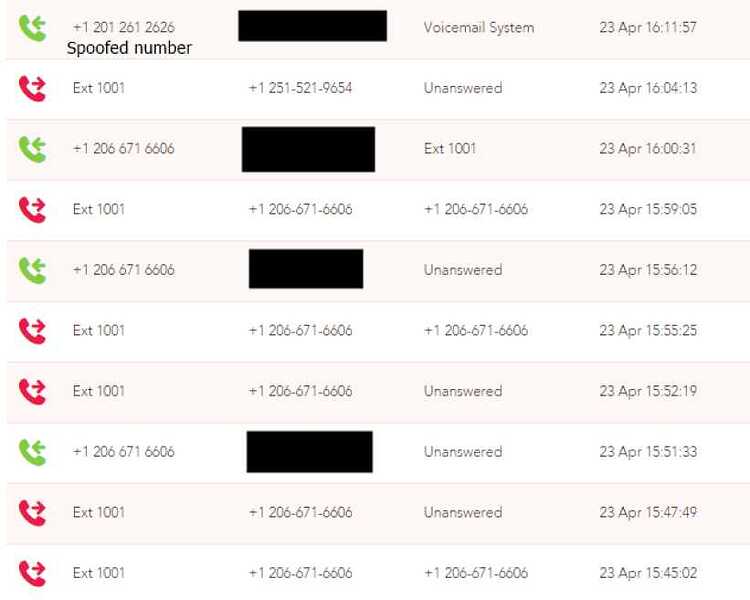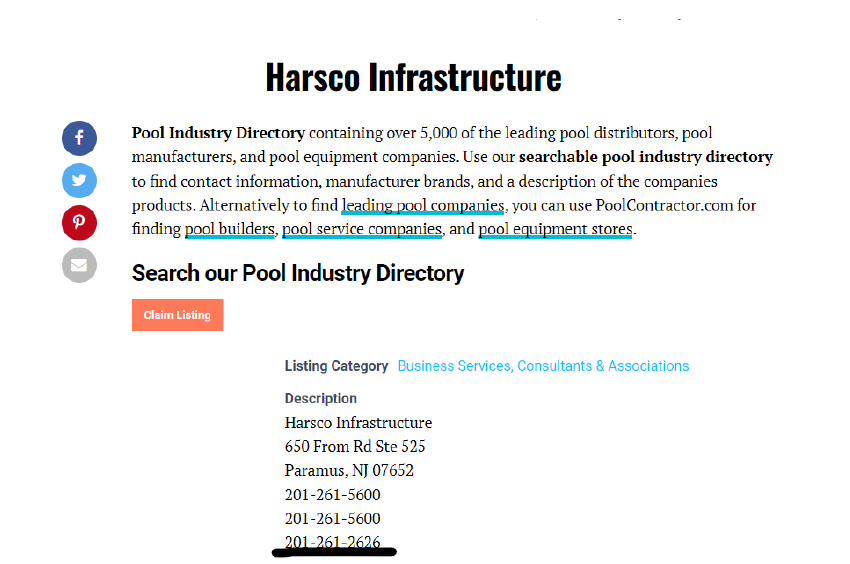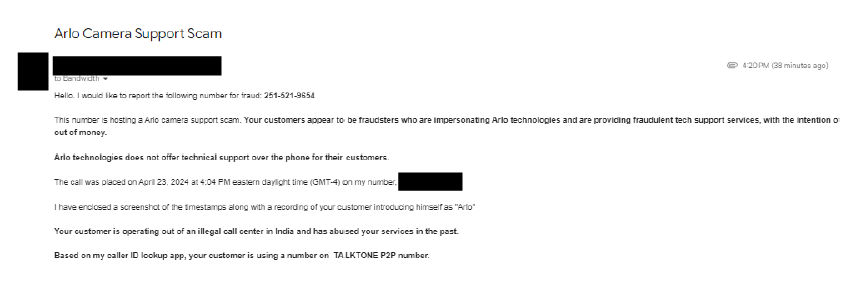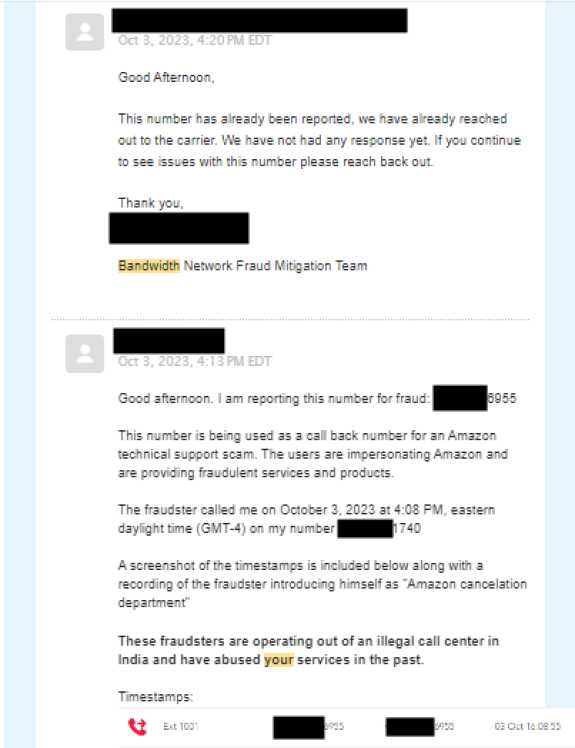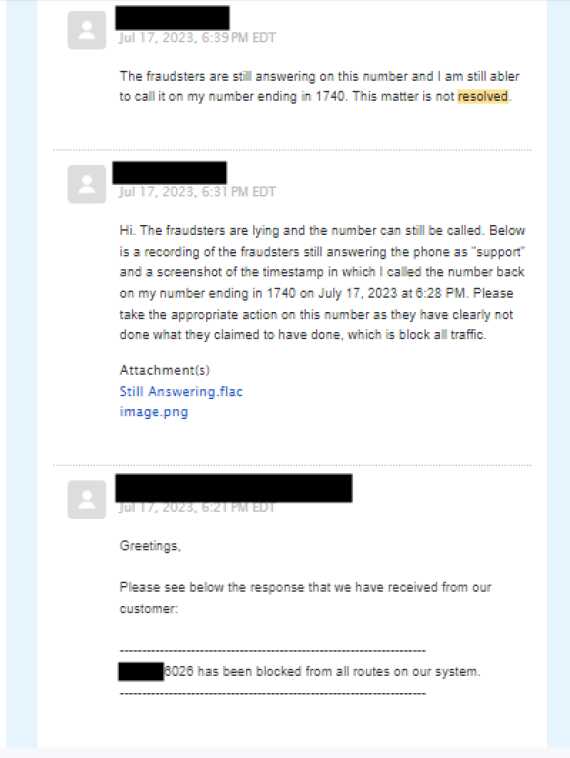Note: This report was written by @Tim_Burr using data collected by the @demurragereports group and a few other members of the commnity.
Arlo/Camera Support Scam: April 23, 2024
Onvoy & Bandwidth
- Number: 206-671-6606 (Onvoy)
- Number: 251-521-9654 (Bandwidth)
Opening
This is a follow up report for the Ring security camera scam filed on April 22, 2024, for the Onvoy number: 817-660-9292.
The number has been disconnected but I cannot confirm if it was due to Sinch or Onvoy terminating the number for fraud, or if it was due to sharing the number on Scammer.info, since neither Sinch or Onvoy reached out to me within the last 24 hours. This is typical and was to be expected. I have never received any emails or responses from Sinch or Onvoy after filling out their webform. I had to call 817-660-9292 myself to verify if it was still live and running.
Today’s Case
The same group of scammers from the previous case, who once again are using both Bandwidth and Onvoy to run their security camera scams, are using 206-671-6606 (Onvoy) to run a Ring camera support scam, along with; 251-521-9654 (Talktone P2P via Bandwidth), to run an Arlo camera
support scam. (recordings provided below)
These scammers are operating out of an illegal call center in India. They are not in the United States but regularly buy US numbers from US telecoms to run their scams.
-
206-671-6606 (Onvoy):
-
251-521-9654 (Talktone P2P via Bandwidth):
As stated in the previous report, the goal of this scam is to “sell” the victims a phony subscription package. The scammers will claim it is needed in order to fix whatever problems the victims may be experiencing with their devices. The scammers will also ask the victims for their personal details, such as their email address and their passwords, something that no legitimate business would ever ask for.
Please keep in kind, Arlo Technologies does not offer technical support over the phone, nor do they outsource their support services overseas or through 3rd party services or groups. 206-671-6606 was reported to Sinch via their webform on April 23, 2024 at 3:54 PM, eastern. 251-521-9654, is on Talktone P2P, a reseller on Bandwidth. This number was reported via email; [email protected] on April 23, 2024 at 4:20 PM, eastern. (See screenshots below for both reports)
Sinch & Bandwidth Reports
Call Experience & History
After verifying that the numbers were being used to run scams, the scammers proceeded to call me back numerous times, just as they did on 4/22/2024. After ignoring some of their calls on the reported numbers, the scammers proceeded to call me back on a spoofed number; 201-261-2626. After checking this number, I concluded that it belongs to a pooling company; Harsco Infrastructure, a legitimate business. (see screenshot below).
Under the current STIR/SHAKEN rules, spoofing numbers should not be possible but spoofing happens regularly. We have seen scammers who are operating from overseas call centers spoof numbers frequently, with no action being taken from the telecoms to prevent this from happening.
Continued Problems With Reporting Numbers
With Sinch, I was sent a confirmation that my report was received but no further follow-ups or responses were issued by either party on the status of my report. This erratic and inconsistent behavior by Sinch is well known and is the reason why their reputation is extremely poor… see additional cases
With Bandwidth, I ran into a familiar scenario where the resellers on their network behave irresponsibly and incompetently. Bandwidth closed my support ticket and marked it as “resolved” despite no direct action being taken from Bandwidth or their reseller, Talktone P2P. (screenshot below)
Bandwidth’s stance on fraud is to forward the report to their resellers/customers if the number in question does not belong to them directly. While this seems logical, it can lead to scenarios like the one above. A scam number will remain online for days while Bandwidth does nothing to intervene, leaving the case solely in the hands of their resellers, who sometimes don’t respond at all. This lack of action from both parties allows the scammers to continue their illicit activities without any
consequences. see additional cases below
As of the time of this writing; April 23, 2024, 6:24 PM, both numbers are live and go directly to voicemail. (recordings provided below)
- 251-521-9654 (Talktone P2P via Bandwidth):
- 206-671-6606 (Onvoy): 206-671-6606
*Update. As of May 7, 2024, Talktone P2P has still not answered the original ticket report, nor have they provided Bandwidth an update. Bandwidth has yet to contact me on the status of this case.
Additional Cases
Sinch’s inconsistent track record goes back several years.
I present another case of the same security camera scammer using an Onvoy number;
810-281-7333, to run an Arlo camera support scam. This number has been reported twice to Sinch via their webform. The first report was filled out on March 20, 2024. The second report was filled out on March 22, 2024.
As of April 23, 2024, 5:18 PM eastern - more than a month later, 810-281-7333 is still live and still answering as “Arlo support”. (See screenshot and recording below)
6
Arlo scam; 810-281-7333 (Onvoy)
Never once did Sinch or Onvoy ever reach out to me for a follow-up or an update on the status of these cases.
Bandwidth: In some cases, we’ve had the scammers themselves lie to Bandwidth on behalf of the resellers. The scammers will claim that the number was taken down after the report was received, only for us to call the number back and listen to the same scammers answer the call.
Bandwidth closed our tickets without checking to make sure that the reseller/customer was being honest. We had to reopen many cases and submit more evidence to assure them that their reseller/customer was being dishonest. (see screenshots below)
This lax stance when it comes to their resellers and the lack of enforcement on Bandwidth’s behalf is unacceptable.
Closing & Suggestions
- All telecoms must have not only a reliable email address for complaints, but also a webform
with the option to submit a recording/screenshot. - All telecoms must contact the person who filed the report if a number has been taken down for fraud/provide updates to the person.
- All telecoms must accept general fraud reports as opposed to only accepting “unwanted calls”. The nature of the scammers business has never just been mass robo calls. The many pop up scams and refund email scams both display a number in which the potential victim is INSTRUCTED TO CALL for technical support/refund support. The victims in this case ARE NOT RECEIVING CALLS and the goal of these scams is to get the victim to call the number on the pop up/scam email.
- This notion of only reporting and accepting “unwanted calls” by carriers like DipVtel, 800TFN and Sinch does nothing in regards to shutting down a scam phone number with a campaign assigned to it in the form of a pop up or a scam email.
- All telecoms must act within a reasonable amount of time, no later than 24 hours but
preferably on the same day. This is not an unreasonable request. There are telecoms that act on abuse reports on the same day that they are received. We can and will happily supply examples of this if needed. - KYC must be enforced. Scammers operating overseas are buying US numbers on a daily basis, without ever stepping foot in the United States. Scammers are using phony details, often using street names that don’t even exist and paying for these US numbers in their own nation’s currency. Never once are they asked to verify their details or their locations by the telecoms. We can provide an example of a telecom not enforcing and ignoring KYC if needed. It should not be this easy for overseas scammers to buy US numbers. This must change.
- Finally, all telecoms must call the numbers and verify the reports themselves. We cannot stress enough how important this is and it baffles us that telecoms do not call the numbers that are reported to them. This must change. If it does not, phone scams and more specifically, phone scams from overseas scammers will remain a constant problem in the United States.
To fix the problem, the telecoms must be held accountable by changing the way they deal with fraudulent traffic on their networks. The telecoms must act, change and make it easier for consumers and victims alike to report scam numbers on their networks.
By adapting the proposed methods listed above, scammers will find it extremely difficult to continue their operations. The nature of the phone scam business relies heavily on potential victims calling the scammers. Without a working phone number, that spam email containing a phone number for bogus “support” to dispute a phony charge is rendered useless. Without a working call back number and the ability to spoof numbers, the scammers cannot continue to harass victims and consumers alike with scam calls. The scam numbers would not stay online for very long if the telecoms would begin acting on consumer complaints in a timely manner.
